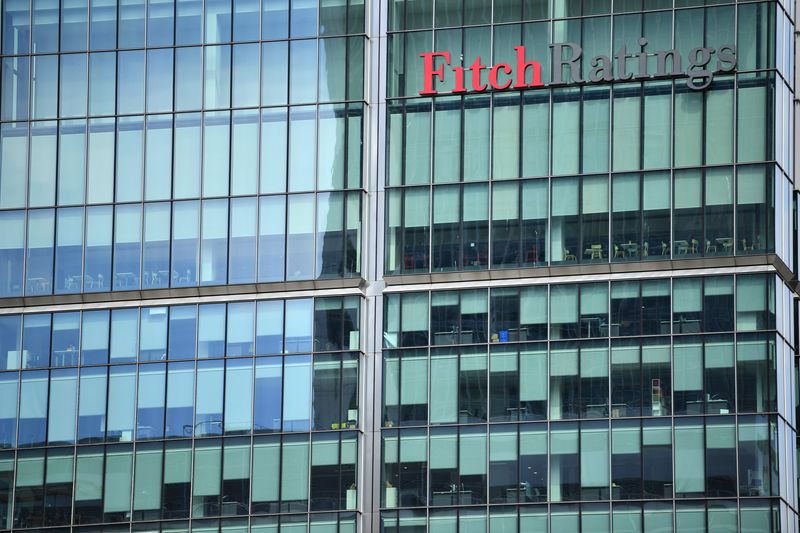By David Lawder and Davide Barbuscia
WASHINGTON (Reuters) - When Fitch Ratings dropped its bombshell downgrade of the U.S. credit rating on Tuesday, Biden administration officials cried foul over the "bizarre" timing and argued that it unfairly punishes them for political chaos under President Donald Trump.
Harvard's Larry Summers and JPMorgan (NYSE:JPM)'s Jamie Dimon were among those who blasted the decision as "inept" and "ridiculous," respectively, questioning the timing of the downgrade two months after the White House and Congress had worked together to avert a debt ceiling crisis.
However, Fitch followed a well-established process as it made its assessments in previous weeks and included U.S. officials at several steps along the way, Reuters' reporting shows. Fitch told the U.S. Treasury about its ultimate decision about 24 hours ahead of the announcement.
Fitch announced in late May, at the height of the debt ceiling stalemate between President Joe Biden and Republicans in Congress, that the U.S. AAA rating was being put on credit watch-negative.
At that time, Fitch warned of brinkmanship over the debt ceiling, "failure of the U.S. authorities to meaningfully tackle medium-term fiscal challenges" and a growing debt burden.
Richard Francis, a senior director at Fitch, told Reuters on Wednesday when asked about the timing of the downgrade, that the agency "wanted to kind of really take a deep look" at long-standing concerns around governance and the U.S. debt profile.
Despite the bipartisan debt deal in June, Fitch's continued concern about debt ceiling brinksmanship, a broken budget process and rising debt levels were made clear last week in discussions the agency held with U.S. Treasury officials about the factors being considered in its ratings review, U.S. officials said.
Fitch's recent talks with the Treasury did not include the actual downgrade decision, Francis said, because it had not yet been made by the agency's ratings committee.
"We didn’t actually say we were about to downgrade but we did say that we would have an upcoming committee soon," Francis told Reuters on Wednesday.
On Monday, Fitch's credit committee met, made a decision, and Treasury officials received the Fitch press release of the downgrade. That gave Treasury about 24 hours to craft a public response -- a notification that one U.S. official said was consistent with past reviews.
Sharing the press release ahead of time allows Fitch to ensure that "there's nothing factually wrong in the report and to make sure there’s nothing (in it) that they told us in confidence," Francis said.
The exact moment of the downgrade announcement Tuesday afternoon, just minutes after former President Donald Trump was indicted for attempts to overturn the 2020 election, was settled weeks before.
"The timing of the committee was pure coincidence," Francis told Reuters on Friday, noting the date was set weeks ago. "The committee was held on Monday, July 31st. We always give the authorities twenty-four hours to respond and publish after markets close."
Fitch cited "erosion of governance," including repeated debt limit standoffs with last-minute resolutions as a key factor in its decision, along with rising debt levels and lack of progress in tackling medium-term fiscal challenges such as rising Social Security and Medicare costs.
The Biden administration says that is unfair.
Debt ceiling votes have been "acrimonious for decades," one U.S. official complained, referring to a long history of standoffs. "It strikes us as quite strange to take the successful resolution this time, with over $1 trillion of deficit reduction, as a negative sign by Fitch in this case."
Biden administration officials complain that Fitch "repeatedly brought up" in meetings the Jan. 6 insurrection at the U.S. Capitol as Trump sought to overturn election results as a sign of eroded governance.
Putting aside the timing of the latest decision, the longer-term issues that Fitch has highlighted resonate.
"Fitch isn't telling anybody anything they don't already know," said Mark Sobel, a former longtime Treasury official who is now U.S. chairman of financial think-tank OMFIF.
Fitch's assessment of U.S. debt sustainability in the near term is wrong, Sobel said, because the dynamic U.S. economy is keeping it afloat.
But longer term, he said, "neither political party has evinced the guts to begin making the sacrifices needed on both the spending and revenue sides -- which will only increase as time marches on."
"May Alexander Hamilton rest in peace," Sobel added, referring to the first US Treasury secretary who tackled the new country's government debt with a new wave of taxes and other revenue-generating measures.
